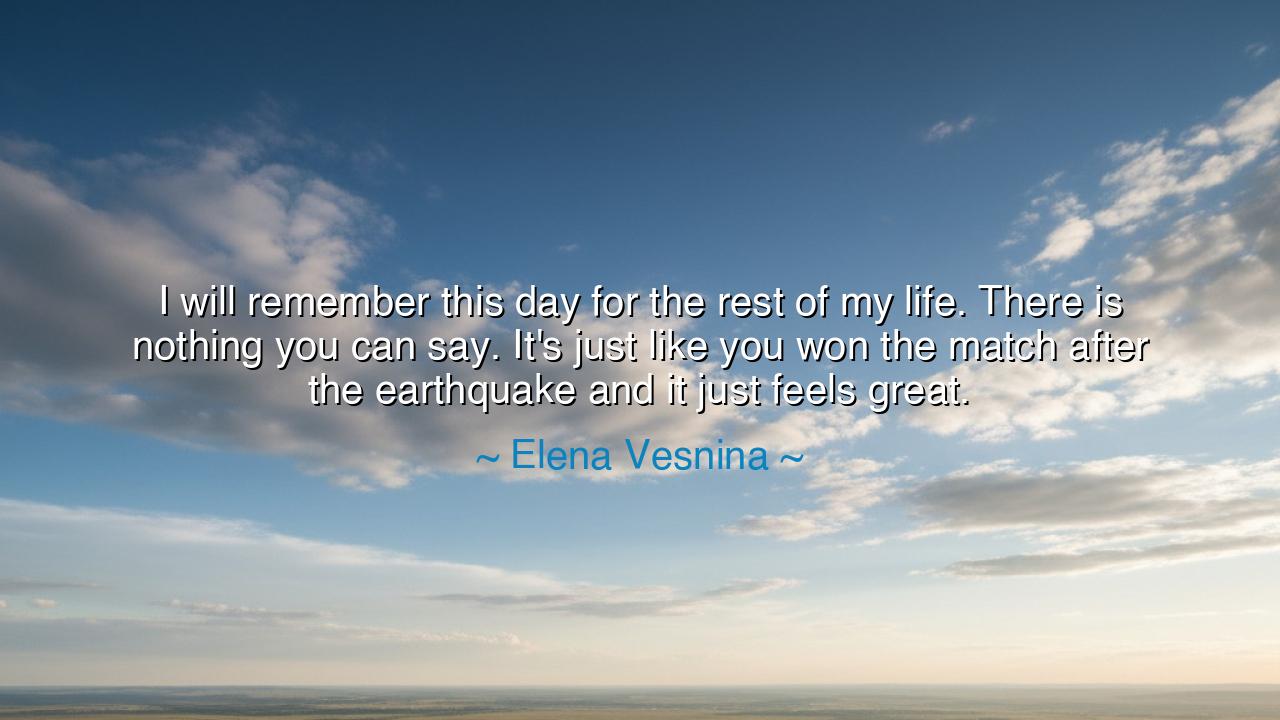
I will remember this day for the rest of my life. There is
I will remember this day for the rest of my life. There is nothing you can say. It's just like you won the match after the earthquake and it just feels great.






“I will remember this day for the rest of my life. There is nothing you can say. It’s just like you won the match after the earthquake and it just feels great.” — so declared Elena Vesnina, a warrior of the tennis court, her words trembling with the intensity of survival, triumph, and awe. In this moment of emotion, she was not merely speaking of a victory in sport, but of the profound resilience of the human spirit — that wondrous capacity to rise after upheaval, to rebuild after ruin, to feel joy even when the ground beneath has shaken. Her words capture what the ancients long knew: that true victory is born from chaos, and that joy is deepest when it follows pain.
In every age, the world trembles — sometimes with war, sometimes with disaster, sometimes with the inner quakes of the human heart. Yet those who endure, who keep standing when all seems lost, come to understand the taste of triumph that Vesnina describes. “It’s like you won the match after the earthquake,” she says — a metaphor for life itself. For who among us has not faced a quake of the soul? Who has not felt the ground of certainty split beneath them, forcing them to rebuild from the rubble of despair? To win after such a storm is not a simple victory — it is rebirth.
The earthquake in her words is not only literal but spiritual. It is every trial that shakes a person to their core — injury, failure, doubt, heartbreak, or fear. Vesnina’s reflection reminds us that greatness is not forged in comfort but in catastrophe. The ancients taught that the gods test the worthy not to destroy them, but to temper them like steel. From the ruins of destruction comes the architecture of strength. To stand after falling is the purest act of courage; to smile after shaking is the highest act of faith.
Consider Japan after the great earthquake of 2011, when destruction fell upon its cities and seas alike. Yet from that devastation rose stories of unity, patience, and resolve — people who, though broken in body and home, refused to yield in spirit. When the world watched, expecting despair, they saw instead the quiet dignity of perseverance. So too does Vesnina’s triumph speak for all who rise again, who win not because the world was easy, but because they refused to let it end them.
In every victory hard-earned, there lies a sacred silence — the silence of one who has passed through trial and returned changed. “There is nothing you can say,” Vesnina admits. For words fall short before the immensity of relief, the wonder of survival. When the soul emerges from its own earthquake, it does not boast — it breathes. That breath is the hymn of gratitude, the whisper of realization that life itself is the greatest prize.
The ancients would have compared such moments to the phoenix rising from the ashes, or the warrior standing upon the battlefield after the storm. To win after the earthquake is to witness the divine truth of existence: that no ruin is final, and no darkness eternal. Even the ground that trembles beneath us is only preparing us to find our balance anew. In this, we see that what matters most is not the fall, but the return — not the trembling, but the standing still.
Let this be the lesson of Vesnina’s words: when your own life quakes — when the familiar breaks and the dust rises — do not despair. Stand. Endure. Continue. For one day, you will look back and say, “I will remember this day for the rest of my life.” You will have won not merely a match, but yourself.
For in the end, the earthquake of life does not bury the strong — it reveals them. And when the shaking stops, when the silence returns, when you stand upon the broken earth and feel the pulse of your own heart still beating — then, as Elena Vesnina said, “it just feels great.”






AAdministratorAdministrator
Welcome, honored guests. Please leave a comment, we will respond soon